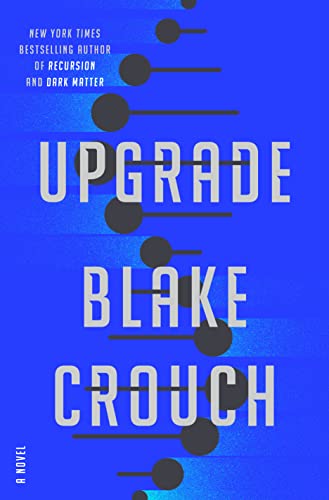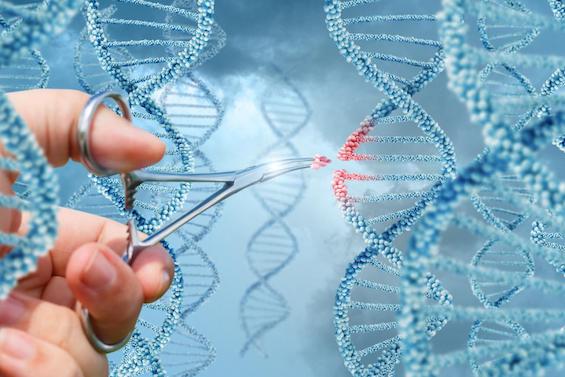
Estimated reading time: 6 minutes
Robotics. Artificial intelligence. Nanotechnology. These fields, among others, compete for attention as the seminal technology of the 21st century. But no field of scientific endeavor holds more promise of bringing greater change to the world around us in the years ahead than gene editing. Powered by CRISPR-Cas9, molecular biologists now possess the capability to alter our minds and bodies by manipulating the DNA code that makes us who we are. The brilliant science fiction author Blake Crouch explores this potential in his near-future thriller, Upgrade. At times shocking, the novel points the way to a time not far off when the post-human future might open up.
A guilt-ridden federal agent working to suppress gene editing
Logan Ramsay is a Special Agent with the Gene Protection Bureau, a new and growing US federal agency established to suppress experiments in gene editing. Years earlier, an extraordinarily gifted molecular biologist named Miriam Ramsay—Logan’s mother—had released an altered locust in China in hopes of protecting the rice harvest. Instead, the superbug triggered the Great Starvation. Two hundred million died. Now, gene editing is a crime, and Logan is on assignment in Denver, following a notorious scientific criminal. When he enters a basement where work is allegedly underway, an explosion sends him to the hospital . . . and a massive series of physical and intellectual changes that may affect the whole human race.
Upgrade by Blake Crouch (2022) 352 pages ★★★★★

“A sense of things in decline”
It’s now late in the 21st century. Long-distance travel is by hyperjet and hyperloop. Self-driven electric cars run at 200 miles an hour for up to 1,000 miles on a charge. For some, the possibilities of self-fulfillment are limitless. But all is not well.
“I was alive in strange times,” Logan reflects. “There was a palpable sense of things in decline. Africa alone had four billion people, most of whom were food insecure and worse. Even here in America, we were still crippled by rolling food shortages, supply-chain disruptions, and labor scarcity.” Now, synthetic food is the rule, natural food an expensive exception.
As Logan laments, “We lived in a veritable surveillance state, engaged with screens more than with our loved ones, and the algorithms knew us better than we knew ourselves.” Now, “for every one hundred people in the United States, there were 48.7 surveillance cameras, and behind them a network of AI-driven facial-recognition search engines, paired with deeply eroded privacy laws.”
The climate has, of course, run amok. “Parts of New York City and most of Miami were underwater, and an island of plastic the size of Iceland was floating in the Indian Ocean. . . [and] there were no more glaciers in Glacier National Park.”
“The future was here, and it was a f***ing mess.”
But gene editing promises worse
“Most of the outlaw scientists we targeted,” Logan observes, “were criminals, plain and simple. . . Then there were the labs of my nightmares, where terrorist organizations engineered pathogens and weaponized life-works of destruction.” In the USA, the main line of defense against these malefactors is the Gene Protection Agency, best known as the GPA. “We were a young but quickly growing agency, with five hundred employees compared to the FBI’s forty thousand. There were only fifty special agents like me.” Logan, wracked by guilt over his mother’s catastrophic error, and his own work with her as a teenager, is one of the GPA’s most dedicated agents. And that helps explain why GPA Director Edwin Rogers is at his side when he awakes in the ICU of a Denver hospital.
Gradually, Logan becomes aware that in the explosion he’d “been infected, not only with a virus of unknown origin, but with a payload encoding the most powerful genome-modifying system ever created,” As the weeks unfold, he experiences a cascade of changes that, at length, endow Logan with extraordinary powers. So many changes that, he is convinced, he is no longer human. But as he escapes from the hospital and sets out in pursuit of the criminals who infected him. the question is, will he still be able to relate to his loving wife and teenage daughter? And will he be forced to confront others with superhuman powers?
A dystopian view of the planet’s future
As his mother had told Logan, explaining humanity’s failure to confront the world’s problems, “It’s denial. Selfishness. Magical thinking. We are not rational beings. [Humans] seek comfort rather than a clear-eyed stare into reality. We consume and preen and convince ourselves that if we keep our heads in the sand, the monsters will just go away.” And, as Blake Crouch seems to see it, this mindset has led our species to set planet Earth well on a course to a future without the species that now dominates all the rest. Us.
About the author

Blake Crouch is best known for the chilling Wayward Pines Trilogy, which Netflix adapted into a widely watched television series in 2015. But he is the author of fourteen other novels, including Dark Matter and Recursion. Crouch is a North Carolina native and a graduate of the University of North Carolina at Chapel Hill with a degree in English and creative writing.
For related reading
I’ve reviewed the three novels of the Wayward Pines Trilogy as well as two other science fiction novels by the author:
- Pines—Wayward Pines #1 (A truly original work of speculative fiction)
- Wayward—Wayward Pines #2 (Paradise lost in a small Idaho town)
- The Last Town—Wayward Pines #3 (A science fiction trilogy reaches a surprising conclusion)
- Dark Matter (A journey into the multiverse)
- Recursion (Spoiler alert: If you want to read this book, skip this review)
For another novel of the same title and on the same general theme—but much inferior—see Upgrade (Human++ #1 of 3) by Dima Zales (On the road to transhumanism).
For more good reading, check out:
- The top 10 dystopian novels
- These novels won both Hugo and Nebula Awards
- The ultimate guide to the all-time best science fiction novels
- 10 top science fiction novels
- 10 new science fiction authors worth reading
And you can always find my most popular reviews, and the most recent ones, on the Home Page.

























